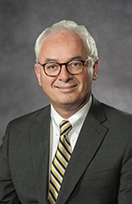Dear Colleagues-Friends,
We are very pleased to share that VCU School of Medicine had an impressive increase in National Institute of Health (NIH) funding in 2018, up 13% from 2017 to $61,040,373, with major gains in both basic health science and clinical departments. This increase drove our relative position among U.S. medical schools up several notches to number 60. Several School of Medicine departments experienced gains in NIH funding of more than 10%, including Biochemistry & Molecular Biology, Neurology, Pediatrics, Pharmacology & Toxicology, and Psychiatry. Pharmacology and Toxicology continues to be one of the top 20 such departments in the country. The Department of Psychiatry also joins the top 20 list this year, due in part to the refunding of the Wright Center for Clinical and Translational Research with a five-year $21.5M Clinical and Translational Science Award last year. Our congratulations and thanks to the scientists in each of these departments.
Among the NIH Institutes that fund VCU research, the National Institute on Alcohol Abuse and Alcoholism (NIAAA) and the National Institute on Drug Abuse (NIDA) provide over $5.9M and $9.1M, respectively. Impressively, our School of Medicine ranks #11 and #16 among all schools of medicine in NIAAA and NIDA funding, respectively. At a time when NIH funding is extremely competitive, this is very encouraging news for our research community, our medical school and our university.
We have made several new funding sources available to support research and discovery. Based on clinical revenues, we returned $3.5 million (Value and Efficiency Teaching and Research or VETAR dollars) to clinical departments and to a research-education group to support education and research collaborations for faculty. We have also established a new health innovation consortium to support innovations that you may propose for our health system. We have also collaborated with our VA partners to create new McGuire VA-VCU SOM partnership grants. For more information on any of these new programs, we circulate weekly a Research Opportunities and News email, which you can receive by contacting Sandra Sorrell. We would also like to emphasize the Presidential research Quest (PeRQ) grants and the Wright Center for Clinical and Translational Research pilot funding and career development opportunities as additional, ongoing sources of support for research.
In addition to providing new funding opportunities, we are working collaboratively to improve the research environment, especially with respect to our clinical trials operations and IRB review processes. Each of these are substantial undertakings, and we welcome your continued feedback.
We recognize that this recent upturn in our research portfolio, while encouraging, needs continued investments of faculty and facilities. Presently, we have several key recruitments among basic science faculty. Additionally, we are recruiting research faculty particularly in cancer, cardiovascular disorders and neurosciences. Last Friday, our VCU Board of Visitors approved the campus master plan for facilities, including the proposed Transdisciplinary Neurosciences Building. We are now proceeding to hire an external architect for preplanning of the Transdisciplinary Neurosciences Building.
We thank everyone who has helped us achieve these vital milestones in rankings, recruitments, and facilities and we look forward to continuing to build our research capabilities.
With all good wishes,
Peter F. Buckley, M.D.
Dean, VCU School of Medicine
Executive Vice President for Medical Affairs, VCU Health System